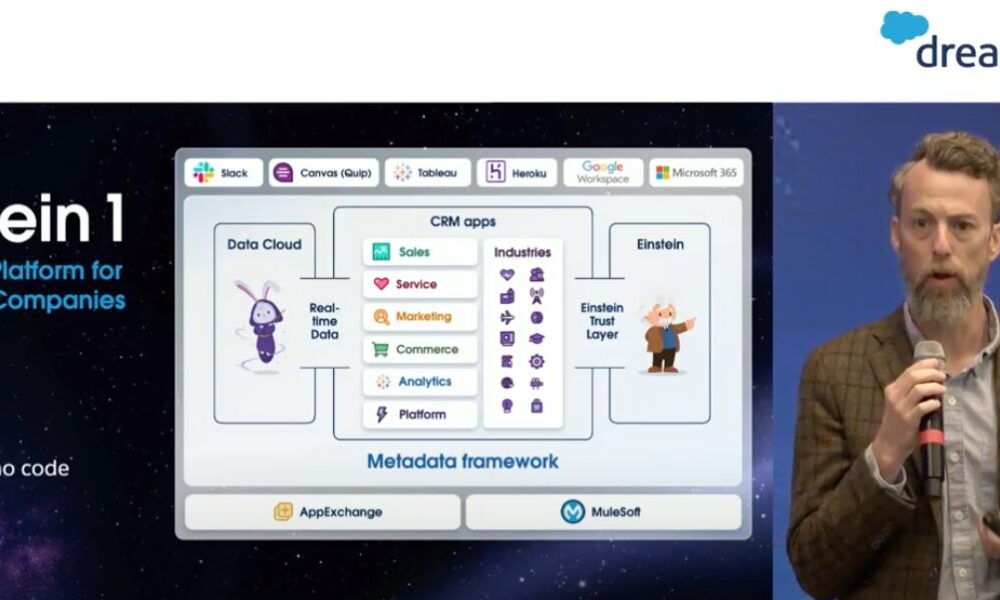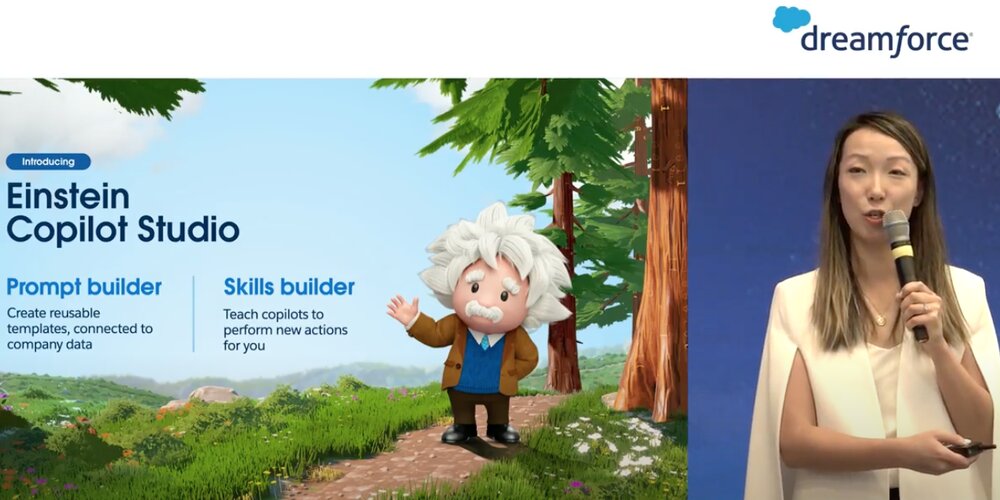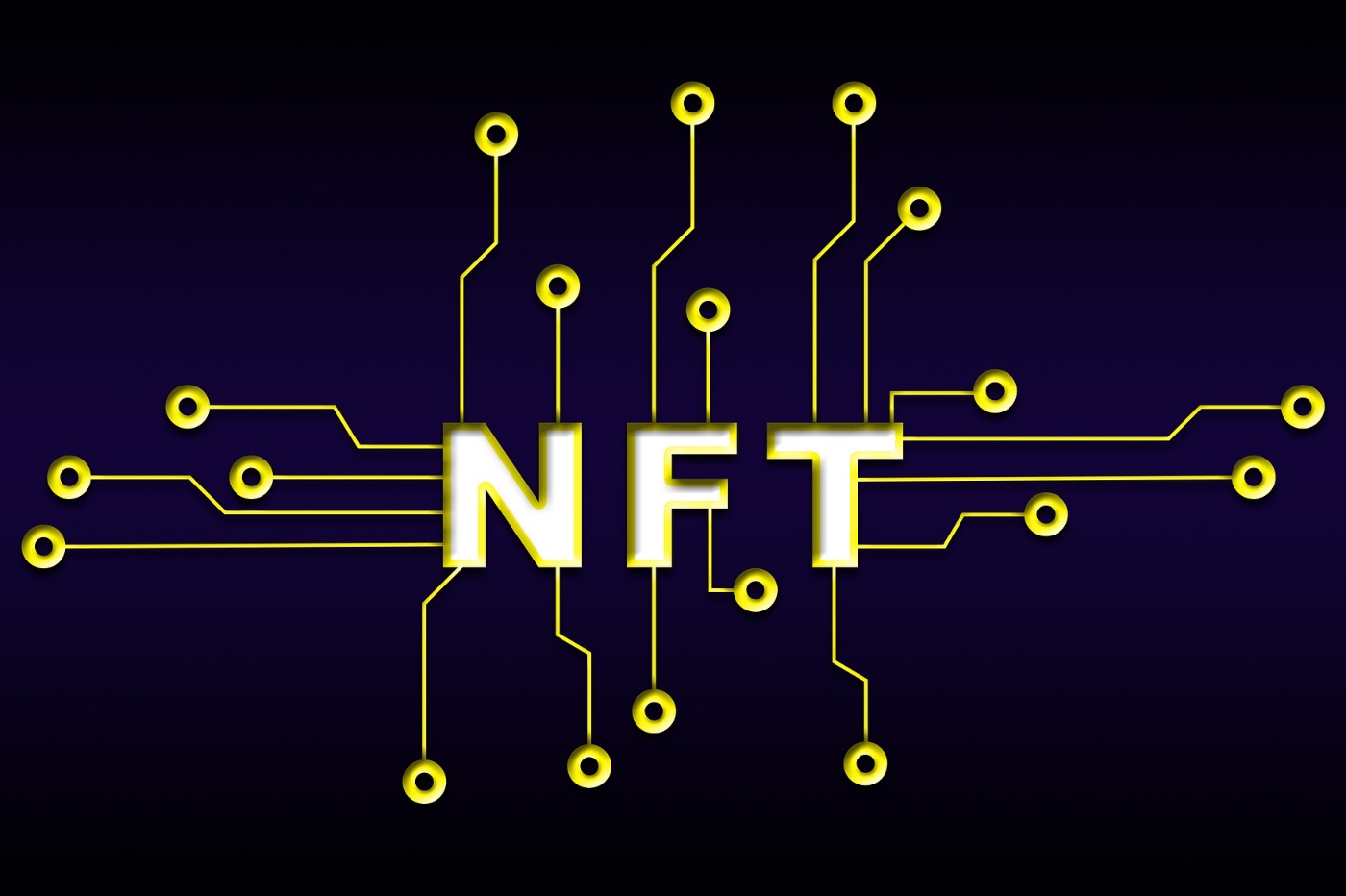
Despite having launched a few days before Dreamforce 2023 the news from the Slack platform, Salesforce plus news prepared for your event. The main ones are the Einstein Platform 1, which offers various enhancements to Salesforce Data Cloud and Einstein AI; and the new version of its AI technology, Einsteinwhich includes both Copilot and Copilot Studio.
Einstein 1, AI for working with data
The Einstein 1 platform offers new features for the Salesforce data cloud, as well as for Einstein Artificial Intelligence, developed from the company’s metadata framework. With it, companies will be able to securely connect any type of data to apps powered by AI, and do so with very little code. In this way they will be able to improve their experience with CRM tools and improve the management of information about their clients.
The Salesforce metadata framework helps companies organize and understand the data they have in their company’s applications. It is similar to having a common language that allows different applications, but developed from a common platform, to communicate with each other. With its new features, you will be able to generate a unified view of a company’s data, regardless of how it is structured or whether it is in different systems, which is achieved by mapping the information in the Salesforce metadata framework.
Thus, companies will be able to personalize each user experience and use their data through various low-code platform services. These include Einstein for AI predictions and content generation, Flow for automation, and Lightning for user interfaces. These customizations are available immediately for a company’s core applications, without having to write integration code to achieve them.
Salesforce will offer automatic platform updates three times each year, and the metadata framework prevents integrations, customizations, and security models from breaking. Companies can add, expand, and build on the platform as it evolves.
Data Cloud, the real-time hyperscale data engine, unifies and harmonizes customer data, company content, telemetry data, Slack conversations, and other structured and unstructured data, with the goal of offer a single view to the client. From now on, among its new features, it will be integrated into the Einstein 1 platform, which gives it various new capabilities.
This will enable businesses to access siled data in new ways, improve CRM experiences and create rich, unified customer profiles. Einstein 1 supports thousands of metadata-driven objects per client, each capable of billions of rows. Additionally, marketing and e-commerce clouds, and consumer-scale technology stacks that have joined the company’s Customer 360 portfolio through purchasing, have been redesigned to integrate into the Einstein 1 Platform.
It supports huge amounts of data from other systems, making them immediately available as Salesforce objects to perform tasks with. Streams can be triggered by a change to any scale object, up to a maximum of 20,000 events per second; and then be able to interact with any company system through MuleSoft.
With the common metadata schema and Einstein 1 access model, Salesforce analytics and insights solutions can work on the same data at scale. Salesforce customers with Enterprise Edition and higher can start using Data Cloud at no additional cost. Among the capabilities it includes is the possibility for companies to unify up to 10,000 employee profiles, and two Tableau Creator.
On the other hand, Einstein carries a conversational assistant with generative AI integrated into the workflow, which aims to improve productivity. Thus, each CRM application will have an assistant. Among them is Einstein Copilot (in testing) that helps users with their workflow and allows them to ask questions in natural language, issuing relevant and reliable answers based on the company’s proprietary data, which will be secure in the Data cloud.
Copilot proactively executes actions and offers additional options that go beyond a user’s request. For example, it is able to recommend an action plan after a data call or change a shipping date. Einstein also runs Copilot Studio, which gives businesses what they need to develop AI-powered apps with custom prompts, skills, and AI models for a variety of purposes.
Among them, closing sales agreements faster, optimizing customer service, automatically creating websites based on browsing history, or converting propmts from natural language to code. You can also configure it to offer Einstein Copilot on customer-facing channels, such as web pages with real-time chat, or integrate it into messaging platforms, such as Slack, Whatsapp or SMS.
Both Einstein Copilot and Einstein Copilot Studio will work on Einstein Trust Layer, a secure AI architecture natively integrated into the Einstein 1 Platform, enabling teams to use generative AI while preserving the privacy of their data and meeting security standards. It will be in the testing phase throughout this fall. As for the Einstein Trust Layer improvements, they will be available starting next October, and integrated into Einstein products.
Einstein, Salesforce’s AI technology: with Copilot and Copilot Studio
Salesforce has also announced the new version of its Artificial Intelligence technology, Einstein, which now includes both Copilot and Copilot Studio. The first is a chatbot that will be responsible for generating recommendations and offering content, based on company data, for various tasks. Among them the development of virtual storefronts, writing custom code or generating data visualizations. It will integrate natively with the Salesforce CRM, and will take data from any Salesforce application to generate more accurate responses in terms of data and content.
Through natural language prompts, Copilot will be able to perform various tasks in the areas of sales, customer service, marketing and e-commerce. Also, without leaving the development environment, pass natural language prompts to Apex code, suggest more effective and precise code and search for vulnerabilities in the code
Working with Tableau, it will allow you to go from raw data to information that can be used in a conversational interface. In addition, it will increase the productivity of data analysts thanks to the natural language assistant, which will perform faster data exploration, develop relevant visualizations based on best practices, automate repetitive tasks and drive efficient data curation.
Regarding assistance to professionals from different sectors, it will be able, among others, to facilitate the work of financial advisors, administrators in the health sector, automotive service providers or administrators of educational centers.
Einstein Copilot Studio is used to customize Einstein Copilot, as well as to develop and adapt AI assistants through relevant prompts, skills and AI models focused on achieving specific sales, customer service, marketing, IT or e-commerce tasks. In addition to using Copilot with Salesforce apps, with Copilot Studio you can customize it for use with public-facing channels. It will allow AI assistants to be integrated into websites to offer real-time chat, in addition to doing so with messaging platforms, such as Slack, WhatsApp or SMS.
Copilot Studio will include Prompt Builderwhich will help users develop, test and deploy generative AI prompts in line with the company’s communication style, and do so without having technical experience, thanks to low-code.
Apart from this, it will take ModelBuilder, with which you can use one of Salesforce’s large language models or integrate one of its partners, to train and adjust them with Data Cloud data without having to copy or move information. It will support integrations with Amazon BedRock, Amazon SageMaker, Anthropic, Cohere, Databricks, OpenAI, and Vertex AI from Google Cloud.
Refering to architecture with AI Einstein Trust Layer, integrated into the Salesforce Platform, allows users to benefit from generative AI without putting their customer data at risk. It is integrated into every Einstein Copilot by default, and works with zero data retention policies. Its creators ensure that companies can rest assured that their data will never be held up by third-party providers of large language models. Additionally, it masks personally identifiable information for greater data privacy.
It also incorporates a large toxicity and risk detection language model for brands, tuned to score AI generations and provide confidence that responses are safe. Every AI interaction is captured so companies have visibility and control over how their data is used.




